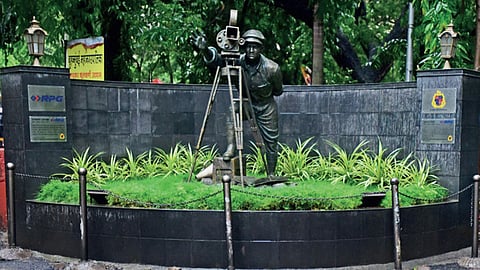Tracing the legacy of Bandra's Mehboob Studios, a breeding ground of Bollywood's cult classics
Mehboob Studio, a name synonymous with the Indian film industry, has stood the test of time as a historic landmark and a thriving hub of creativity. Nestled in the heart of Bandra, this is a place where the echoes of Bollywood's past reverberate through the corridors, and the magic of cinema continues to unfold every day.
In the annals of Indian cinema, the name 'Mehboob Khan' stands as a beacon of innovation and cinematic excellence. Khan's journey as a director began in 1935, but it was in 1942 that he etched his name in history by establishing Mehboob Productions. This move paved the way for some of the most iconic films Bollywood has ever seen, including the hits 'Anmol Ghadi' (1946) and 'Andaz' (1949).
The emergence of Mehboob Studio
Mehboob Khan was not just a visionary director; he was also a strategic thinker. Unlike older studios like Filmistan and Bombay Talkies, which were situated in the distant locales of Goregoan and Malad, Mehboob Khan envisioned a studio closer to central Mumbai. Thus, the foundation of Mehboob Studio was laid in Bandra West, with construction completed in 1954.
The studio's inauguration coincided with Mehboob Khan's film-making endeavours. He had just completed 'Aan' (1952) and was in the midst of shooting the Dilip Kumar-starrer 'Amar' (1954). While 'Paisa hi Paisa' and 'Awaaz' were among the initial productions at the studio, it was 'Mother India' (1957) that truly catapulted Mehboob Studios to fame.
Within a decade of its inception, Mehboob Studios became the preferred destination for stars and directors alike. Its proximity to the residences of many film industry luminaries made it a hub of creativity.
Mehboob Studios has also played host to other iconic productions. Guru Dutt chose this picturesque setting for his timeless classic 'Kaagaz Ke Phool', while actor-director Dev Anand made it the home of Navketan Films, where he created cinematic gems like 'Hum Dono' and 'Guide'. Dev Anand even maintained an office at the studio complex for two decades, a testament to the enduring allure of Mehboob Studios.
'Son of India' marked the end of an era
Following the phenomenal success of 'Mother India', Mehboob Khan struggled to regain his former prominence in the film industry. His subsequent projects failed to replicate the acclaim and success he had achieved earlier. 'Son of India' marked the end of an era as it was the last film produced under the banner of Mehboob Productions.
In the 1970s, Mehboob Studios experienced a resurgence when the rights to 'Mother India' returned to the Khan family, breathing new life into the studio. During this period, they also added a recording studio. Despite facing challenges like encroaching real estate development and a destructive fire in December 2000, the studio persevered.
In a tribute to Mehboob Khan's lasting legacy, the Indian Postal Department issued a commemorative stamp in September 2007 during his centenary celebration at the studio.
Knock Knock
Beyond film shoots, today the studio thrives with cultural activities, from music festivals to intellectual discussions and art exhibitions. Adapting to change, Mehboob Studio remains a timeless haven in the midst of Mumbai's evolution from 'Bombay', undisturbed by the tides of time.
As we reflect on the rich history of Indian cinema, Mehboob Studios remains an integral part of its legacy. It is not merely a studio; it is a shrine of creativity and innovation that continues to inspire generations of filmmakers and artists.
To get all the latest content, download our mobile application. Available for both iOS & Android devices.

